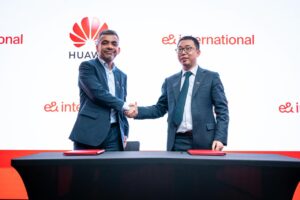 In order to build the capacities of the UAE ICT sector to meet the standards and requirements of the Internet Protocol Version 6 (IPV6) in the UAE, the Telecommunications Regulatory Authority (TRA) has organized an IPV6 training course in its new building in Al Mamzar area, Dubai, from March 25th to the 29th 2012. The TRA has invited delegations from GCC countries to attend the training course, along with approximately 30 technical participants from UAE governmental entities. The course will be organized in coordination with RIPE NCC, a leading provider and registry internet resource allocations in the region.
In order to build the capacities of the UAE ICT sector to meet the standards and requirements of the Internet Protocol Version 6 (IPV6) in the UAE, the Telecommunications Regulatory Authority (TRA) has organized an IPV6 training course in its new building in Al Mamzar area, Dubai, from March 25th to the 29th 2012. The TRA has invited delegations from GCC countries to attend the training course, along with approximately 30 technical participants from UAE governmental entities. The course will be organized in coordination with RIPE NCC, a leading provider and registry internet resource allocations in the region.The training course is part of the TRA’s endeavor to launch initiatives with the aim to prepare the ICT sector to adopt the latest technologies making the sector comparable to other ICT sectors around the world, in light of the increasing importance of the UAE position as an international hub in commerce, tourism, and other fields. Evidence of the growing cooperation between the TRA and RIPE NCC, the training courses will be focused and highly technical. They are considered to be a part of the initiatives developed to promote and build the capacity that will enable the sector to adapt to change and new technologies. The courses will also help ensuring the required national technical resources in order to enable the inclusion of this version in the forthcoming national projects related to the IPV6 in the UAE.
“In the UAE, we are aware of the constant evolution of the ICT sector,” said H.E. Mohamed Nasser Al Ghanim, Director General of the TRA. “Accordingly, we work on spreading awareness about IPV6 in the country and rolling it out for both public and private sectors. So, to enable both of these sectors to benefit from the transition to IPV6, we organized this training course for the governmental entities, which will no doubt be a critical factor in assuring a smooth transition to IPV6.”
The core objective of the IPV6 training is to allow the participants to recognize the importance of adopting this latest internet protocol in their networks, build technical capacities to accommodate the applications and services, and ensure the switch to the latest version within the coming years; the IPV4, the current version, will soon be exhaustedaccording to IANA Number resources.
“Organizing this training is a testament to the leadership position of UAE in the ICT sector. This training will open the door for experts and technicians to meet and share opinions and ideas, and learn procedures to facilitate the transition and adoption of IPV6. Building IPV6 capacities is also harmonious with the World Summit on the Information Society WSIS (2003/2005) objectives, putting our nation on the world map,” added Al Ghanim.
The TRA will supply all workshop materials; it will also provide a virtual laboratory for participants allowing them to gain practical expertise in handling IPV6 in terms of preparing networks and testing their settings as per the global scenarios.
The TRA had launched on July 24th 2011 its IPV6 training program that involved practical sessions giving participants the opportunity to get acquainted with IPV6 and the level of consistency in other countries with new changes in this field. The program focused on building capacities of the federal governmental entities, and stressed the importance of switching to IPV6 to maintain pace with international standards. This helps provide opportunities and future innovations, and ensures that the UAE is home to the best world-class technologies.











